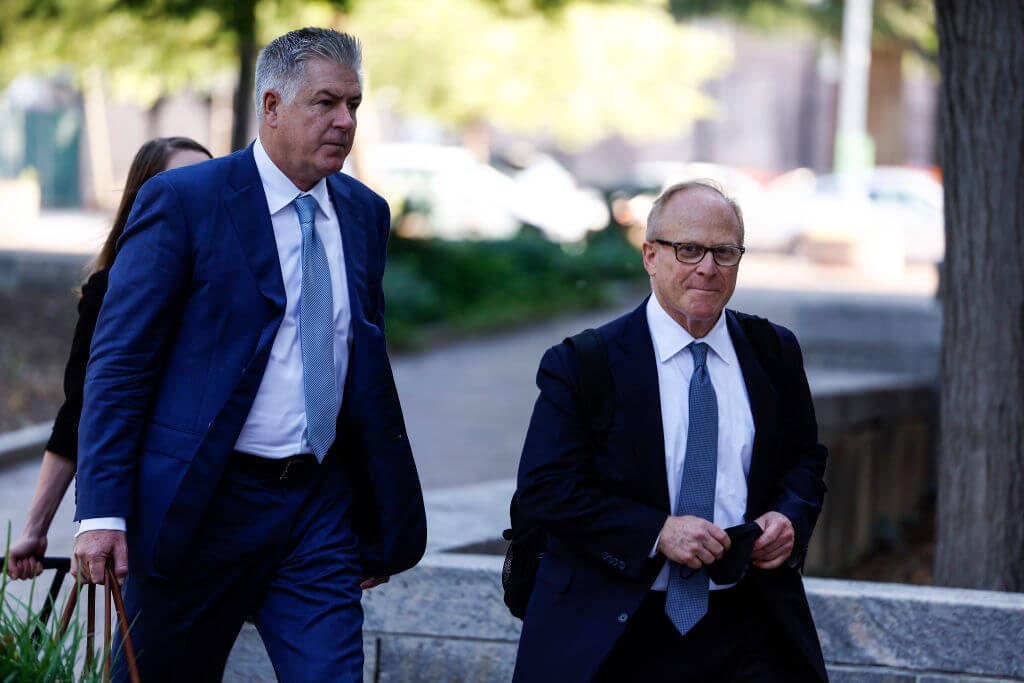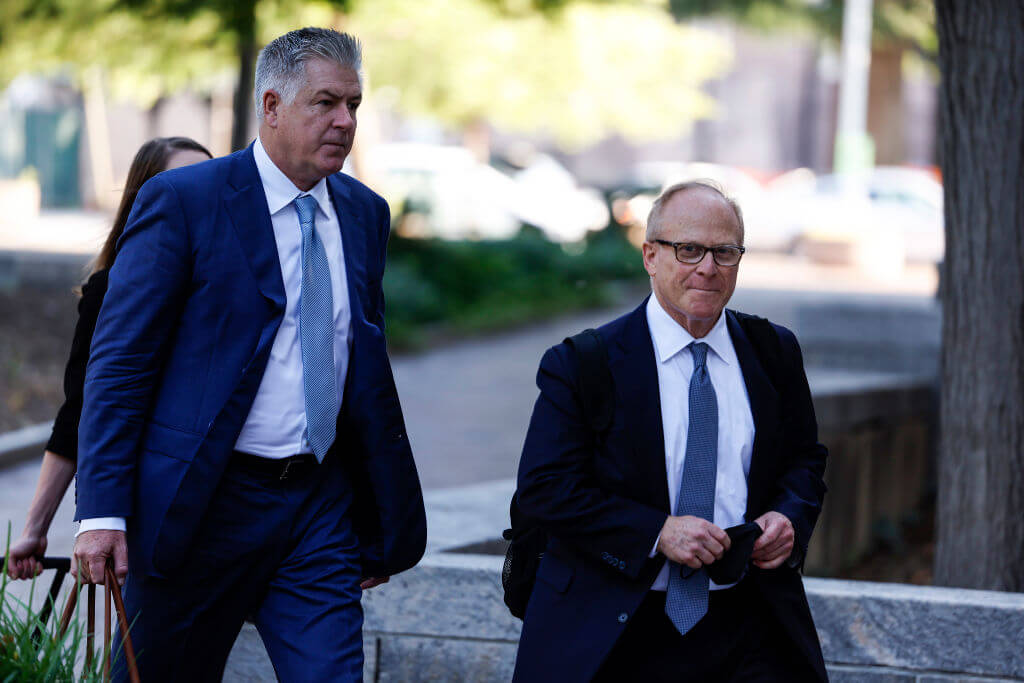Uncategorized
Lebanese Army Walks Political Tightrope to Disarm Hezbollah

A Lebanese military vehicle drives, after Israeli troops withdrew from most of south Lebanon, in Mays al-Jabal, near the border with Israel, southern Lebanon, Feb. 19, 2025. Photo: REUTERS/Mohammed Yassin
Lebanon’s army has blown up so many Hezbollah arms caches that it has run out of explosives, as it races to meet a year-end deadline to disarm the Iran-backed Shi’ite terrorist group in the south of the country under a ceasefire agreed with Israel, two sources told Reuters.
The explosives shortage, which has not been previously reported, has not stopped the army quickening the pace of inspection missions to search for hidden weapons in the south, near Israel, the two said, one of whom is a security source and the other a Lebanese official.
It would have been unimaginable for Lebanon’s military to embark on such a task at the zenith of Hezbollah‘s power just a few years ago, and many observers were skeptical even after the ceasefire agreement.
But Hezbollah was hit hard by Israel’s war last year, which killed thousands of fighters and the upper echelons of both the military and political wings, including leader Hassan Nasrallah. The war also killed more than 1,100 women and children and destroyed swathes of Lebanon’s south and east.
The US has kept up pressure on Lebanon to disarm Hezbollah, which is designated a terrorist group by Washington. President Donald Trump’s deputy Middle East envoy Morgan Ortagus is in Beirut this week to discuss momentum on disarmament with Lebanese officials.
As they wait for US deliveries of explosives charges and other military equipment, Lebanese troops are now sealing off sites they find instead of destroying them, said one of the sources and two other people briefed on the army‘s recent activities.
Their searches yielded nine new arms caches in September, the two other briefed officials said. The security source said dozens of tunnels used by Hezbollah had also been sealed and more soldiers were being steadily recruited to deploy to the south.
Reuters spoke to 10 people including Lebanese officials, security sources, diplomats, and a Hezbollah official, all of whom said the army expects to complete its sweep of the south by the year’s end.
Meeting the deadline would be a considerable feat for an institution once unable or unwilling to stop Hezbollah rebuilding a military presence near Israel after a previous war in 2006 – and for a country in which Hezbollah was once the dominant political force.
ARMY STEPS CAUTIOUSLY ELSEWHERE IN LEBANON
Progress in the rest of the country looks far less certain.
Despite its advances, the army wants to avoid inflaming tensions and to buy time for Lebanon’s politicians to reach a consensus about the group’s arsenal in other parts of the country, a second Lebanese official who is close to Hezbollah and two security sources said.
It has not published images of the work destroying weapons caches, or even said the weapons belong to Hezbollah.
Under the November 2024 ceasefire that ended more than a year of hostilities between Israel and Hezbollah, Lebanon agreed that only state security forces should bear arms in the country. That would mean fully disarming Hezbollah.
Hezbollah has publicly committed to the ceasefire but is not a formal signatory. It insists the disarmament as mentioned in the text only applies only to the south of Lebanon.
On Sept. 5, the cabinet adopted a more detailed five-phase plan for imposing the state monopoly on arms – starting in the south and gradually moving north and east, the security sources and the second Lebanese official said.
The army said it would clear the south by December, without committing to a timeline for the rest of the country. The government has said the plan is contingent on Israel halting air strikes that have continued despite the ceasefire. All the sources said the army would have to navigate treacherous political terrain to achieve full disarmament.
Ed Gabriel, who heads Washington-based non-profit the American Task Force Lebanon and met with Lebanon’s military and political leaders in October, said the army‘s cautious approach reflected the possibility of civilian strife if it moved too fast outside of the south.
“It’s a Lebanese answer to disarmament,” he said.
Hezbollah has not opposed the seizures of unmanned weapons caches in the south and has not fired on Israel since the November truce. However, it has publicly refused to relinquish its weapons elsewhere, hinting conflict was possible if the state moved against the Islamist group.
Moving north and east without a political consensus risks confrontation with Hezbollah fighters or street protests by Lebanon’s Shi’ite community, among whom Hezbollah remains popular, the two security sources and the second Lebanese official said.
In a written statement to Reuters, Hezbollah‘s media office said the ceasefire meant Lebanon’s army was fully responsible for the zone south of the Litani River, referring to the water body that crosses southern Lebanon near Israel.
But any disarmament efforts north of the river would require political consensus, it said.
“The rest – that depends on a political settlement, which we don’t yet have. The army is betting on time,” said a Lebanese official close to the group.
The army still fears a stand-off with Hezbollah‘s constituency could again fracture the army, which split during Lebanon’s 15-year civil war, one Lebanese official told Reuters.
In a speech on Sunday, Hezbollah secretary general Naim Qassem described the army‘s approach as good and balanced but also issued a warning, saying he hoped the army was not considering clashing with the Shi’ite community.
The media offices of the Lebanese army, cabinet, and presidency did not respond to questions from Reuters for this story. The Israeli military did not respond to requests for comment.
MULTIPLE WEAPONS CACHES FOUND AND DESTROYED
The army does not possess its own information on where Hezbollah‘s stockpiles are located, two security sources told Reuters. It has relied on intelligence supplied by Israel to “the Mechanism,” the sources said, referring to a committee established by the truce deal, chaired by the US and including France, Israel, Lebanon, and UN peacekeepers.
In late May, the army was receiving so many reports from the Mechanism that it could not keep pace with the requests for inspections, the two sources said.
If troops found a depot, they kept any ammunition or new equipment compatible with their own arms and destroyed rockets, launchers, and other material, the two sources said.
Operations in the south by the UN peacekeeping force UNIFIL yielded tunnels dozens of meters long and unexploded ordnance, according to UNIFIL statements.
The army depleted its explosives stocks by June. In August, six army troops were killed trying to dismantle an arms depot. Reuters could not determine additional details of the circumstances of the accident.
The US is keen to help: in September, it announced $14 million in demolition charges and other aid to help Lebanese troops “degrade Hezbollah” and approved $192 million aid to the army the day before the US government shutdown.
The US also approved $192 million aid to the Lebanese army the day before the US government shutdown.
US Senator Jeanne Shaheen advocated for the aid after a visit to south Lebanon in August left her impressed with the army‘s efforts and convinced it needed more support, an aide in her office told Reuters.
It could still take months for the detonation charges to be delivered Lebanon, a source familiar with the process said.
WILL THEY, WON’T THEY
In recent months, Hezbollah‘s position about the future of its weapons has appeared fluid. In public statements, the group warned the state against trying to seize its arsenal – but also said it would be willing to discuss the fate of its arms if Israel commits to a real ceasefire.
In private, some representatives of the group have floated the possibility that progress could be made elsewhere if reconstruction allowed Shi’ite constituents to return to villages and towns destroyed in the war, the Lebanese official close to the group said. Others have flatly rejected decommissioning its weapons under any circumstances.
The group is still conducting internal discussions on the future of its arsenal and is also playing for time, the Lebanese official close to Hezbollah and a Lebanese political source said.
In its written statement, Hezbollah said the status of its weapons depended on an end to the Israeli aggression, its withdrawal from the occupied Lebanese territories, the return of prisoners, and ensuring reconstruction.
NEXT STEPS POSE CHALLENGE
The security sources say that a lack of information makes it difficult for the army to estimate what exactly Hezbollah has stored, and where, including in the eastern Bekaa – a vast plain where Hezbollah is thought to store the bulk of its long-range missiles and other strategic arms.
Israel provided some reports of weapons in areas north of the Litani but the army deemed them too sensitive to act on without a consensus on whether and how to disarm Hezbollah there, one of the security sources and one of the diplomats based in Lebanon said
Despite providing intelligence on weapons locations, Israel is proving another obstacle in the south, the officials briefed on the cabinet meeting said.
Several soldiers have been wounded by Israeli fire while on inspection missions, the two security sources said. Israeli drones have dropped grenades near soldiers and UN peacekeepers in the south, UNIFIL has said.
The army has also warned that Israel’s occupation of five hilltops within Lebanon near the border with Israel could delay a full sweep of the area, the two security sources said.
And when Lebanese troops tried to erect a rudimentary watch-tower to monitor the border, Israel objected, the two security sources said. The tower remains unmanned.
The Israeli military did not respond to questions about the wounded Lebanese troops and the abandoned watchtower.
Washington is keen to see Lebanon expedite disarmament in the rest of the country after meeting the year-end deadline for the south, the congressional aide said. US envoy Tom Barrack has warned of possible Israeli action if that deadline is not met.
“The US sees that Lebanon needs to do more, and faster,” Gabriel said.
The United States fully supports Lebanon’s “courageous and historic decision to disarm Hezbollah,” a US State Department spokesperson said in response to Reuters questions.
“The region and the world are watching carefully,” the spokesperson said.
Uncategorized
A border official mocked an attorney for observing Shabbat. Orthodox lawyers say the issue is not new.

Gregory Bovino, the Border Patrol official who led immigration raids in Minneapolis, reportedly mocked the Jewish faith of Minnesota’s U.S. attorney during a phone call with other prosecutors in mid-January. According to The New York Times, Bovino complained that Daniel Rosen, an Orthodox Jew, was hard to reach over the weekend because he observes Shabbat and sarcastically pointed out that Orthodox Jewish criminals don’t take the weekends off.
The call took place at a moment of extreme tension in Minneapolis, as federal agents under Bovino’s command carried out an aggressive immigration crackdown that had already turned deadly. It came between the fatal shootings of Renée Good and Alex Pretti, both killed during enforcement operations, and amid fierce backlash from local officials and residents.
Bovino made the remarks in a derisive, mocking tone, the Times reported, casting Shabbat observance as a point of ridicule. Bovino had already drawn national attention for frequently wearing an olive double-breasted greatcoat with World War II-era styling, leading some critics to call him “Gestapo Greg” and accusing him of “Nazi cosplay.” Bovino, who pushed back on those comparisons, has since been reassigned.
Rosen, a Trump nominee, was confirmed as Minnesota’s U.S. attorney in October 2025 after a career in private practice and Jewish communal leadership. He has said that rising antisemitism helped motivate his decision to take the job, and that prosecuting hate crimes would be a priority for his office.
For many Orthodox Jewish lawyers, Bovino’s alleged remarks were not surprising. They echoed a familiar challenge: explaining that Shabbat — a full day offline — is not a lack of commitment, but a religious boundary that cannot be bent without being broken.
In a profession that prizes constant availability, that boundary can carry consequences. Some lawyers say it shows up in subtle ways: raised eyebrows, jokes about being unreachable, skepticism when they ask for time off. Others say it has shaped much bigger decisions, including how visibly Jewish they allow themselves to be at work.

David Schoen, an Orthodox criminal defense attorney who served as lead counsel for President Donald Trump during his second impeachment trial, said he has long been mindful of how religious observance is perceived in the courtroom.
“I have made a conscious decision not to wear my yarmulke in front of a jury,” Schoen said, explaining that jurors often “draw stereotypes from what they see.”
Those concerns were reinforced by experience. Schoen said he has noticed a “definite difference in attitude” from some judges depending on whether he wore a yarmulke. In one case, he recalled, a Jewish judge pulled him aside during a jury trial and told him she thought he had made the right choice — a comment Schoen said he found disappointing.

For Sara Shulevitz, a criminal defense attorney and former prosecutor, the Bovino episode brought back memories from early in her career.
Orthodox and the daughter of a Hasidic rabbi — now married to one — Shulevitz said her unavailability on Jewish holidays was often treated as a professional flaw rather than a religious obligation. “It held me back from getting promotions,” she said.
In court, the scrutiny could be blunt. “I was mocked by a Jewish judge for celebrating ‘antiquated’ Jewish holidays,” she said, recalling requests for continuances for Shemini Atzeret and Simchat Torah. In another case, she said, a judge questioned her request for time off for Shavuot and suggested she had already “taken off for Passover.”
When another judge assumed Passover always began on the same day in April, “I had to explain the Jewish lunar calendar in the middle of court while everyone was laughing,” she said.
Not every encounter, Shulevitz added, was rooted in hostility. Sometimes judges simply didn’t understand Orthodox practice. When she explained she couldn’t appear on a Jewish holiday, judges would suggest she join the hearing by Zoom — forcing her to explain that Orthodox Jews don’t use electrical devices on Shabbat or festivals.
The misunderstanding often slid into a familiar assumption. “They think you’re lazy,” she said. “It’s not laziness. Any Jewish woman knows how much work goes into preparing for Passover.”
Rabbi Michael Broyde, a law professor at Emory University who studies religious accommodation, said that Bovino’s alleged “derogatory remarks” are “sad and reflects, I worry, the antisemitic times we seem to be living in.”
He added that the criticism of Rosen reflected a basic misunderstanding of how law offices operate, calling it “extremely rare” for a lawyer’s religious practices to interfere with their obligations, especially when senior attorneys delegate work and courts routinely grant continuances.
“No one works 24/7,” Broyde said.
The episode echoed a similar Shabbat-related incident during Trump’s first term. In his 2022 memoir, former Trump trade adviser Peter Navarro described how a group sought to undermine Trump son-in-law Jared Kushner’s role in the 2020 campaign by scheduling a key White House meeting with Trump on a Saturday, knowing Kushner — who is Shabbat observant — would not attend. Navarro titled the chapter recounting the episode, “Shabbat Shalom and Sayonara.”
The tension between Jewish observance and public life is not new. Senator Joe Lieberman, the first observant Jew to run on a major-party presidential ticket, famously walked to the Capitol for a Saturday vote and ate fish instead of meat at receptions. His longtime Senate colleague Chris Dodd joked that he became Lieberman’s “Shabbos goy.”
Still, Schoen said, visibility can cut both ways. During Trump’s impeachment trial, while speaking on the Senate floor, he reached for a bottle of water and instinctively paused. With one hand holding the bottle, he used the other to cover his head — a makeshift yarmulke — before drinking.
The moment was brief, but it did not go unnoticed. In the days that followed, Schoen said he heard from young Jewish men and businesspeople who told him that seeing the gesture made them feel more comfortable wearing their own yarmulkes at work.
The attention, he said, was unexpected. But for some in the Orthodox community, it became a source of pride.
“I felt honored,” Schoen said.
My guess in all seriousness is that he normally wears a yarmulke and this was reflex. Schoen is modern Orthodox so that would make sense. But I defer to @jacobkornbluh https://t.co/MkKx6W03v2
— Jake Tapper 🦅 (@jaketapper) February 9, 2021
Jacob Kornbluh contributed additional reporting.
The post A border official mocked an attorney for observing Shabbat. Orthodox lawyers say the issue is not new. appeared first on The Forward.
Uncategorized
Deni Avdija becomes first Israeli to be selected as an NBA All-Star
(JTA) — Portland Trail Blazers star Deni Avdija’s meteoric rise has officially reached a new stratosphere, as the 25-year-old forward has become the NBA’s first-ever Israeli All-Star.
Avdija was named an All-Star reserve for the Western Conference on Sunday, an expected but deserved nod after the northern Israel native finished seventh in All-Star voting with over 2.2 million votes, ahead of NBA legends LeBron James and Kevin Durant. Avdija’s breakout performance this season has earned him repeated praise from James and others across the league.
Avdija’s star turn began last year in his first season with Portland, when he further captured the adoration of Jewish fans across Israel and the U.S. But he took another step forward this season, averaging 25.8 points, 6.8 assists and 7.2 rebounds per game. His points and assists clips are by far the best of his career, and rank 13th and 12th in the NBA, respectively. He’s considered a front-runner for the league’s Most Improved Player award.
For close observers of Israeli basketball, Avdija’s All-Star selection is the culmination of a promising career that began as a teenage star with Maccabi Tel Aviv and made him the first Israeli chosen in the top 10 in an NBA draft.
“Deni Avdija being named an NBA All-Star reserve is an unbelievable achievement in the mind of every Israeli basketball fan,” Moshe Halickman, who covers basketball for the popular Sports Rabbi website, wrote in an essay for the Jewish Telegraphic Agency. “This is a dream come true for many — a dream that became realistic and even a must-happen during his breakout season — but something that in his first five seasons in the NBA never came across as something that was going to be real.”
Halickman, who has covered Avdija in Washington, D.C., and in Israel, wrote that Avdija is not only considered the greatest Israeli hooper of all time, but perhaps the best athlete to come out of Israel, period.
Oded Shalom, who coached Avdija on Maccabi Tel Aviv’s Under-15 and Under-16 teams, echoed that sentiment in a recent profile of Avdija in The Athletic.
“Even though he is only 25, I think he is Israel’s most successful athlete in history,’’ Shalom said. “We’ve had some great gymnasts — and I hope everyone forgives me for saying it, because we’ve had some great athletes — but I think Deni has become the greatest.”
Avdija’s ascension has also come against the backdrop of the Gaza war and a reported global rise in antisemitism, which he has said affects him personally.
“I’m an athlete. I don’t really get into politics, because it’s not my job,” Avdija told The Athletic. “I obviously stand for my country, because that’s where I’m from. It’s frustrating to see all the hate. Like, I have a good game or get All-Star votes, and all the comments are people connecting me to politics. Like, why can’t I just be a good basketball player? Why does it matter if I’m from Israel, or wherever in the world, or what my race is? Just respect me as a basketball player.”
Now, Avdija’s talents will be on display at the NBA All-Star Game, on Sunday, Feb. 15, in Los Angeles.
The post Deni Avdija becomes first Israeli to be selected as an NBA All-Star appeared first on The Forward.
Uncategorized
Democratic leader says GOP-led Congress boosted ICE funding while Jewish security is underfunded

House Democratic Leader Hakeem Jeffries used a Jewish gathering in New York on Sunday to spotlight what he described as an imbalance in federal priorities, building on outrage over the Trump administration’s violent crackdown in Minneapolis that resulted in two fatal shootings.
Jeffries criticized the Republican-controlled Congress for boosting immigration enforcement funding by billions while, he said, security funding for Jewish institutions continues to lag amid rising antisemitic threats. He said that in the One Big Beautiful Bill Act, which passed last July and included cuts to Medicaid, the Department of Homeland Security received an additional $191 billion, including $75 billion for ICE.
“If that can happen, then the least that we can do is ensure that this vital security grant program is funded by hundreds of millions of dollars more to keep the Jewish community and every other community safe,” Jeffries said.
The Nonprofit Security Grant Program, established by Congress in 2005 and administered by FEMA under the Department of Homeland Security, provides funding to nonprofits, including houses of worship, to strengthen security against potential attacks. Congress began significantly increasing funding in 2018 after a wave of synagogue attacks nationwide, bringing the program to $270 million today.
Major Jewish organizations are pushing to raise funding to $500 million amid rising antisemitic threats. Last year, the Trump administration briefly froze the program as part of broader agency cuts, and some groups have been reluctant to apply because applicants must affirm cooperation with federal immigration enforcement.
Jeffries said House Democrats strongly support an increase to $500 million annually to meet escalating security needs. “It’s got to be an American issue, because that is what combating antisemitism should be all about,” he said.
The breakfast, previously held at the offices of the UJA-Federation of New York, was held this year for the first time in the events hall at Park East Synagogue, which was the site of a pro-Palestinian protest last year that featured antisemitic slogans and posters.
Sunday’s program also included remarks from Senate Minority Leader Chuck Schumer, who told the audience that his support for Jewish security funding will only continue growing under his leadership, calling it his “baby.”
“As long as I’m in the Senate, this program will continue to grow from strength to strength, and we won’t let anyone attack it or undo it,” Schumer said.
Rep. Jerry Nadler, the co-chair of the Congressional Jewish Caucus who is retiring at the end of the year after 36 years in the House, also spoke at the event. Nadler, like several other Democrats in recent months, compared the actions of ICE agents to the Gestapo, Nazi Germany’s secret police. The comparison has drawn sharp criticism from Democrats, Republicans and Jewish leaders.
Support for Israel aid

Both Schumer and Jeffries vowed in their remarks to continue supporting U.S. military assistance to Israel, amid increasing calls within the party for sharper opposition to Israel. Polls show that Democratic voters are increasingly sympathetic to Palestinians. In July, a record 27 Senate Democrats, a majority of the caucus, supported a pair of resolutions calling for the blocking of weapons transfers to Israel.
“I think it’s the humane thing to do to ensure that Israel has a right to exist as a Jewish and democratic state and eternal homeland for the Jewish people,” Jeffries said. The House Minority Leader, who has cultivated close ties with Jewish leaders since his election in 2012, noted that he has visited Israel nine times. He recalled that on his recent trip, Israel’s ambassador to the U.S., Yechiel Leiter, joked that it might be time for Democrats to buy property in Jerusalem.
Schumer, the nation’s highest-ranking Jewish elected official, has seen his popularity decline and has faced calls to step down from his role as leader. On Sunday, he pledged that he “will always fight to give Israel what it needs to protect itself from the many who want to wipe Israel off the face of the map.”
The post Democratic leader says GOP-led Congress boosted ICE funding while Jewish security is underfunded appeared first on The Forward.


